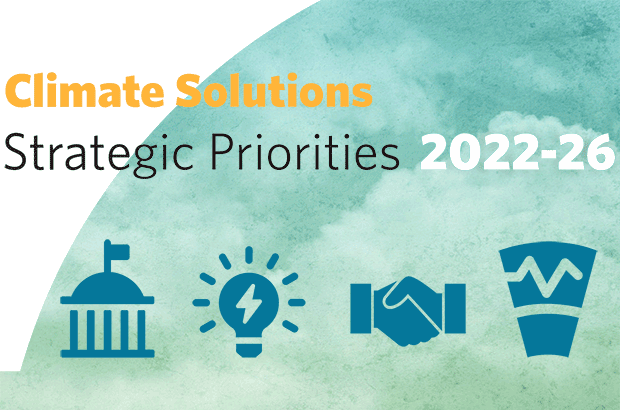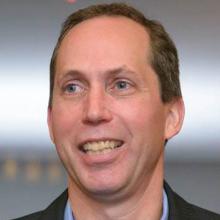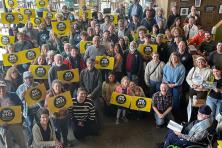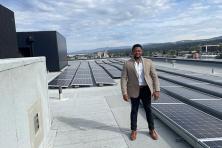The Climate Solutions Board of Directors recently adopted our new strategic plan to map out our direction for the next four years. This is the third time since I started here in 2008 that we have adopted a new strategic plan, and I am more excited about this one than any in our history.
My excitement stems from two places. First, our new plan builds off an era of profound success. In 2016 we launched our last plan. Our primary objective for that five-year stretch was to establish nationally significant policies that would place the Northwest on the pathway to a 100% clean energy economy, while simultaneously helping to build a powerful and diverse climate movement.
We had big dreams for that era of climate action, and to be honest the results far exceeded our hopes. Washington and Oregon now have unquestionably two of the best suites of climate policies of any states in the nation.
We now have policies in both states to transition to 100% clean electricity with the passage of the Clean Energy Transformation Act in Washington in 2019, and the 100% Clean Energy for All in Oregon in 2021.
We have an economy-wide cap on carbon pollution in Washington State with the groundbreaking Climate Commitment Act. We now – finally – have both a clean fuels and a clean trucks coast with both of our states aligned with California to transform our transportation sector. We worked hard with partners to ensure major investments go to Black, Indigenous, and communities of color with effective solutions. We are making progress toward electrifying our buildings, including the recent passage in Washington of the strongest state building code for commercial buildings in the nation. There’s more, and wow, it has been an amazing run.
The past four years have been, by any measure, incredible for climate progress in the region.
The second reason I am so excited is that we have a crystal-clear sense of what is needed as we enter into this new era of climate action in the region. We believe that the core opportunity on climate change in the Northwest in the coming years is turning the promise of passed policies and large investments in solutions into tangible progress on the ground that cuts climate pollution, creates good-paying jobs, and addresses equity.
That is our job moving forward. We need to translate commitments made into promises kept.
In some ways, we will keep doing what we have been doing for the past almost 25 years. We will remain fierce advocates for transformational policies. We will keep building powerful partnerships to grow an increasingly formidable movement. We will communicate a bold vision for what is needed for the Northwest to be national leaders on climate, making an impact beyond our borders. We will lean into our commitments on equity, diversity, and inclusion.
We will also adapt. Our advocacy is a great example. For the past many years, our primary focus was on statewide policies in Salem and Olympia. While we will remain deeply involved there, we will also spread our engagement into the many places where implementation is being discussed such as utility commissions, state agencies, and local governments; with businesses looking to cut their emissions and grow jobs; and more.
Here are some other examples of activities that we are moving on now to kick off the next phase of our strategic plan:
- Running campaigns with diverse allies on a wide range of issues including implementing Washington’s Climate Commitment Act; passing the nation’s best standards for residential homes through the Washington State Building Council; continuing to clean up our transportation sector including the bigger vehicles that are essential, yet harder right now, to electrify; making sure that Washington and Oregon both meet the goals of recently passed bills to transition to 100% clean electricity; and more.
- Launching a new collaborative to support the acceleration of business leadership action on climate in the region working with partners including the Washington Build Back Black Alliance, Clean & Prosperous Washington, Oregon Business for Climate, and the Wave Foundation.
- Coordinating a network of climate, environmental justice, and labor partners to make sure that the many pots of public dollars that are being invested into climate solutions – like highly efficient heat pumps that provide both heat and cooling, renewable energy, and electric trucks – have maximum impact.
- Telling the stories of successful progress in implementing policies and investing in solutions through digital, video, partner collaborations, and other creative ways to educate policymakers, the media, and other key audiences.
- Investing in deep learning as a staff and board on how to make continued progress in our commitment to equity, diversity, and inclusion in this work.
Turning policies and investments into equitable progress on the ground will not be easy. We enter into this era with profound uncertainties and intense cross-currents. Climate impacts are hitting with devastating force with dangerously scorching summers that cause wildfires and heat deaths, along with flooding and other extreme weather. We have high gas and energy costs, an uncertain economy, and an increasingly polarized political environment. We face a powerful opponent in the fossil fuel industry fighting fiercely for its existence.
We also have to figure out how to answer some hard questions about getting equitable solutions on the ground at scale. Questions like where to site solar and wind and storage in ways that respect Tribal sovereignty and environmental concerns; how to quickly and affordably get heat pumps into low-income homes and apartments; and how to scale electric charging stations for cars, vans, trucks, tractors, and e-micro mobility throughout the region including in rural communities.
It won’t be easy, but we see a clear path for progress. We are going to work every day to make sure that the next four years of climate progress in the Northwest are every bit as successful as the last four have been.
Our new strategic priorities are outlined here.






